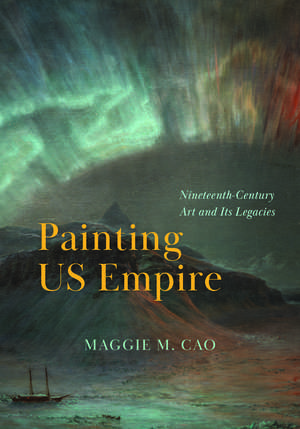Painting US Empire: Nineteenth-Century Art and Its Legacies
Autor Maggie M. Caoen Limba Engleză Hardback – 3 ian 2025
Painting US Empire is the first book to offer a synthetic account of art and US imperialism around the globe in the nineteenth century. In this work, art historian Maggie M. Cao crafts a nuanced portrait of nineteenth-century US painters’ complicity with and resistance to ascendant US imperialism, offering eye-opening readings of canonical works, landscapes of polar expeditions and tropical tourism, still lifes of imported goods, genre paintings, and ethnographic portraiture. Revealing how the US empire was “hidden in plain sight” in the art of this period, Cao examines artists including Frederic Edwin Church and Winslow Homer who championed and expressed ambivalence toward the colonial project. She also tackles the legacy of US imperialism, examining Euro-American painters of the past alongside global artists of the present. Pairing each chapter with reflections on works by contemporary anticolonial artists including Tavares Strachan, Nicholas Galanin, and Yuki Kihara, Cao addresses important contemporary questions around representation, colonialism, and indigeneity. This book foregrounds an underacknowledged topic in the study of nineteenth-century US art and illuminates the ongoing ecological and economic effects of the US empire.
Preț: 278.06 lei
Nou
Puncte Express: 417
Preț estimativ în valută:
53.21€ • 55.13$ • 44.41£
53.21€ • 55.13$ • 44.41£
Carte nepublicată încă
Doresc să fiu notificat când acest titlu va fi disponibil:
Se trimite...
Preluare comenzi: 021 569.72.76
Specificații
ISBN-13: 9780226832418
ISBN-10: 0226832414
Pagini: 360
Ilustrații: 98 color plates, 34 halftones
Dimensiuni: 178 x 254 x 28 mm
Greutate: 1.2 kg
Ediția:First Edition
Editura: University of Chicago Press
Colecția University of Chicago Press
ISBN-10: 0226832414
Pagini: 360
Ilustrații: 98 color plates, 34 halftones
Dimensiuni: 178 x 254 x 28 mm
Greutate: 1.2 kg
Ediția:First Edition
Editura: University of Chicago Press
Colecția University of Chicago Press
Notă biografică
Maggie M. Cao is associate professor of art history and the David G. Frey Scholar in American Art at the University of North Carolina at Chapel Hill. She is the author of The End of Landscape in Nineteenth-Century America.
Cuprins
List of Illustrations
Introduction: Empire and the “American” Artist
1: Growth and Decay in the Southern Tropics
Intervention 1: Germinating
2: The Politics of Ice
Intervention 2: Melting
3: Trompe l’oeil’s Global Goods
Intervention 3: Mimicking
4: Keeping and Losing Time in the Pacific
Intervention 4: Ordering
5: Perils on the Caribbean Sea
Intervention 5: Drowning and Undrowning
Acknowledgments
Notes
Index
Introduction: Empire and the “American” Artist
1: Growth and Decay in the Southern Tropics
Intervention 1: Germinating
2: The Politics of Ice
Intervention 2: Melting
3: Trompe l’oeil’s Global Goods
Intervention 3: Mimicking
4: Keeping and Losing Time in the Pacific
Intervention 4: Ordering
5: Perils on the Caribbean Sea
Intervention 5: Drowning and Undrowning
Acknowledgments
Notes
Index
Recenzii
“The material Cao discusses in Painting US Empire and the arguments she formulates about this material are truly compelling. She draws equally, and impressively, on the form of her objects of study and on archival and historical records, which she mines with great rigor and acuity. This is an important and original work of scholarship.”
“In a transhistorical and global kaleidoscope of tropical plants and taxidermy, blocks of ice and sea-laden watercolors, Cao offers a compelling and ethically grounded rethinking of US art through imperialism. With deft art historical analysis, she demonstrates that nineteenth-century US art was shaped by imperial dreams of conquest, the legacies of which continue to shape the nation and the field of art history. Painting US Empire offers a pathway forward that will inspire others to write new tellings of ‘American art’ that deploy historic artworks as vital tools to begin to redress racism and colonialism.”
